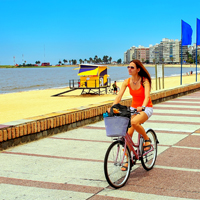What do expats find most challenging?
We asked expats and digital nomads what they find the most challenging about the local culture in Piriapolis. They wrote...
"Bad housing and poor construction standards. Things like plumbing and electricity are often shoddy and dangerous. Floors are usually cement slabs, and most do not have proper vapor barriers so moisture and mold is a constant problem. Fly screens, like in many countries, are rare so houses are filled with mosquitoes and flies and bugs. Driving is dangerous--motorcycles speed along the shoulder of roads and between traffic. Roadways are poorly designed. Cars pull out onto the main highway from gravel roads along the side," explained one expat living in Piriapolis, Uruguay.
 Mobility LC
Mobility LCConnect
Mobility LC is committed to work hard to make your Uruguayan immigration and relocation process a reality. We can provide you with the best local contacts and will guide you all the way through the process offering support in 5 different languages. Your success is our personal goal.
Click connect to have our partner contact you via e-mail and/or phone.
 Mobility LC
Mobility LCMobility LC is committed to work hard to make your Uruguayan immigration and relocation process a reality. We can provide you with the best local contacts and will guide you all the way through the process offering support in 5 different languages. Your success is our personal goal.
Connect
Click connect to have our partner contact you via e-mail and/or phone.
"Expats in Piriapolis often find the language barrier to be the most challenging aspect of the local culture, as Spanish is the official language and not everyone speaks English. They may also struggle with the slower pace of life, which is common in many South American countries. This can be particularly difficult for those used to a fast-paced, deadline-driven work environment. The concept of 'manana' (tomorrow) is deeply ingrained in the culture, which can lead to frustrations with perceived inefficiencies or delays. Additionally, expats may find it challenging to navigate the local bureaucracy, which can be complex and time-consuming. Lastly, while Uruguayans are generally friendly and welcoming, it can take time to build deep relationships and fully integrate into the local community," said another expat in Piriapolis, Uruguay.
Other Questions:
- What do I need to know before retiring in Piriapolis?
- What do I need to know before moving to Piriapolis?
- How do I find a place to live in Piriapolis?
- What is a typical expat home or apartment like in Piriapolis?
- What is the average cost of housing in Piriapolis?
- How do I meet people in Piriapolis?
- What should I pack when moving to Piriapolis?
- Where should I setup a bank account in Piriapolis?
- Will I be able to find a job in Piriapolis?
- What is life like in Piriapolis?
- What do people like (and dislike) about Piriapolis?
- What type of social life can someone expect in Piriapolis?
- What is the social scene like in Piriapolis?
- What advice to expats in Piriapolis have about housing?
- What are medical services in Piriapolis like?
- Are healthcare and health insurance expensive in Piriapolis?
- Is the cost of living in Piriapolis high?
- What are the visa & residency requirements in Piriapolis?
- Why do people move to Piriapolis?
What do expats find most challenging?
If you live in Piriapolis, newcomers to Piriapolis would love to hear your answer to this question.


